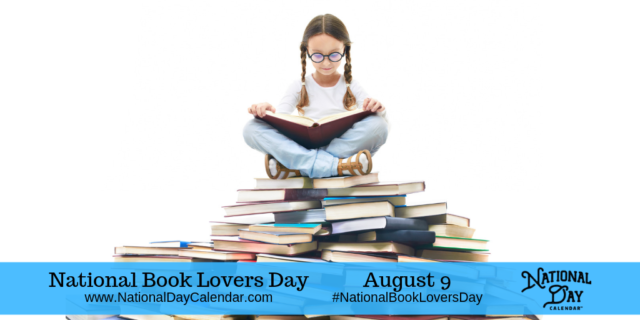
National Book Lovers Day on August 9th harnesses all the excitement bibliophiles feel about books into one celebration.
- Bibliophile – a person who has a great appreciation for or collects books.
- The word for loving the smell of old books is ‘Bibliosmia’.
- The very first books used parchment or vellum (calf skin) for the book pages.
- The book covers were made of wood and often covered with leather.
- The books were fitted with clasps or straps.
- Public libraries appeared in the Middle Ages.
- Public libraries often chained the books to a shelf or a desk to prevent theft.
- Along with several recent developments, book manufacturers use digital printing.
- Book pages are printed using toner rather than ink. As a result of digital printing, print-on-demand opens up a whole new realm of publishing. In this case, distributors don’t print the books until the customer places the order.
- More and more, people read E-books. E-book (electronic book) refers to a book-length publication in digital form. They are usually available through the internet. However, they can also be found on CD-ROM and other systems. Read an E-book on a computer or via a portable book display device known as an e-book reader, such as a Reader, Nook or Kindle.
- There are over 130 million books in print
- The three most read books in the world are The Holy Bible, Quotations from Chairman Mao Tse-Tung, and Harry Potter. (as of March 2018)
- Dr Seuss invented the word ‘nerd’, using it in his 1950 book ‘If I Ran the Zoo.’
- 68% of books sold worldwide are bought by women.
- Fools Of Nature by Alice Brown was the first book to be described as a ‘bestseller,’ in 1889.
- 1453 saw the first ever book published: the Gutenberg Bible. It was printed by the inventor of the printing press, Johannes Gutenberg.
- Longest novel ever written is Remembrance of Things Past by Marcel Proust, containing an estimated 9,609,000 characters.
- In 2017, according to the American Library Association, “Thirteen Reasons Why,” by Jay Asher, was the No. 1 most challenged and banned book. A New York Times bestseller, the book was banned in some schools because it discusses suicide.
- The Harry Potter books have the distinction of being the most banned and challenged book series in the U.S. in this century—No. 1 from 2000 to 2009. Challengers took issue with portrayals of witches and wizards.
- Mark Twain’s Life on the Mississippi (1882) is considered by historians to be the first fully typewritten manuscript sent to a publisher.
- Those bibles you find in hotel rooms are distributed by an organization called Gideons International, founded in 1899. This organization exists for the sole purpose of distributing bibles. As of 2015, Gideons International has distributed over 2 billion bibles and is estimated to distribute more than 2 bibles a second (that’s more than 7,200 an hour)
- In January 2017, two of the biggest trending topics in the media were “fake news” and “alternative facts”. This inspired consumers to buy every physical copy of 1984 from Amazon, the world’s largest online retailer, by the end of the month. Amazon was unable to get more newly printed copies in stock until February 3rd.
- During the Great Depression, one of FDR’s New Deal programs was the Pack Horse Library Initiative. Librarians would ride on horseback into the Appalachian mountains to provide books and literacy to the mountain-folk of Kentucky.
- In order to gain the trust of suspicious mountain families who did not take kindly to outsiders, book carriers would sometimes read bible passages to prove that they were not a threat.
- According to a 2017 study by Kingston University, there is a relationship between reading fiction and real-world social abilities. People who read fiction are more empathetic, open minded to others’ viewpoints, more likely to demonstrate positive social behavior.
- The longest sentence ever printed is 823 words. it’s a legit sentence that exists in Victor Hugo’s Les Miserables,
- President Theodore Roosevelt read one book per day.
- Alice in Wonderland is based on a real 10-year-old girl. Her name was Alice Liddell, and her family was close friends with author Lewis Carroll. While on a boating trip, she asked him to tell her a story — and that’s how Alice was born.
- Virgina Woolf wrote all her books standing.
- Stephen King was once taken for a vandal in an Australian bookshop where he was secretly signing copies of his books. A customer in the shop noticed a man walk in off the street and start signing books, and unaware that it was King, she notified the store staff. The misunderstanding was eventually cleared up, and 5 of the 6 books were given to community groups for fundraisers. The other book was purchased by the customer.
- Ray Bradbury’s famous dystopian novel Fahrenheit 451 was originally called Fireman. The title was thought to be too boring, and Bradbury consulted with a local fire station to find out the temperature at which paper would burn. The fireman had Bradbury wait while they burned a book, and then let him know that it burned at 451 degrees Fahrenheit.
- The line “Me Tarzan, You Jane” never appeared in any of the Tarzan books, and was likely lifted from the 1932 movie Tarzan The Ape Man.
- Another surprising misquote is Sherlock Holmes’ catchphrase “Elementary, my dear Watson.” The phrase never appears in any of the Sherlock Holmes stories, and is first used by P.G. Wodehouse in the novel Psmith, Journalist.
- The 1939 novel Gadsby by Ernest Vincent Wright does not use any words beginning with the letter E in the entire novel. The book was written as a lipogram, which is a kind of writing or word game in which the author deliberately excludes a common letter of the alphabet. While some letters are easier to avoid than others, E, T, and A are the most challenging to ignore.
- The word “unputdownable” is the word that bibliophiles use to describe a book that is so riveting they are unable to put it down and need to read it in a single sitting. The term was apparently coined by author Raymond Chandler in 1947, who when describing a particular book, said he “found it absolutely … unputdownable.”
Sources:












